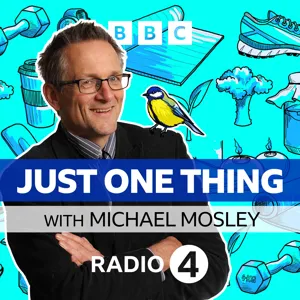Podcast Summary
Stand More for Better Health: Incorporating more standing into your daily routine can boost heart rate, aid metabolism, and enhance psychological health
Making small changes in your daily routine can have a significant impact on your health. Dr. Michael Mosley, a science journalist and host of the BBC podcast "Just One Thing," suggests that one simple yet effective change is to spend more time standing instead of sitting. This can raise your heart rate, help your metabolism, and improve your psychological health. It's an easy and convenient way to boost your overall well-being, especially for those who spend most of their day sitting at a desk. By incorporating more standing into your day, you can improve various aspects of your health without making drastic lifestyle changes. So, next time you're feeling stuck in your chair, try standing up and taking a break. You might be surprised by the positive effects it has on your body and mind. And if you're in the market for a unique engagement ring or planning your next trip, remember to check out Blue Nile and Quince for convenient and ethical shopping options.
The Harmful Effects of Prolonged Sitting and the Benefits of Standing: Prolonged sitting increases health risks, shortens telomeres, and contributes to anxiety and fatigue. Standing for 2-3 minutes every hour can improve health, reduce anxiety and fatigue, and burn more calories. Regular exercise is necessary to fully counteract the negative effects of prolonged sitting.
Prolonged sitting is harmful to our health and can lead to various health issues such as an increased risk of heart disease, type 2 diabetes, and even death from all causes. Sitting for long periods can also contribute to cellular aging, indicated by shorter telomeres. Standing, on the other hand, can have positive effects on our health, including reducing anxiety, fatigue, and increasing engagement with work. A study found that bus drivers, who spend most of their shifts sitting, were at a higher risk of heart attacks compared to bus conductors who stood for long parts of the day. Standing for just 2-3 minutes every hour can help break up prolonged sitting and improve overall health. A study with NHS employees showed that those with standing desks reported fewer symptoms of anxiety and fatigue and greater engagement with their work. Standing also burns more calories and helps clear sugar from the blood more quickly. However, it's important to note that simply standing at work doesn't offset the negative effects of a sedentary lifestyle outside of work hours. To fully counteract the damage of prolonged sitting, at least 40 minutes of moderately vigorous exercise per day is recommended.
The Negative Effects of Excessive Sitting: Prolonged sitting decreases metabolism and circulation, increasing the risk of health issues like type 2 diabetes, cancer, heart disease, and stroke. Break up sitting time with standing or short bouts of physical activity every 30 minutes.
Excessive sitting is linked to various health issues, including an increased risk of type 2 diabetes, cancer, heart disease, and stroke. This is because prolonged sitting decreases metabolism and circulation, keeping our bodies in a resting state for extended periods. Despite our beliefs, we may be more sedentary than we think, as people tend to underreport their sitting time by up to 100%. To counteract the negative effects of sitting, incorporating standing into our daily routine, such as during meetings or phone calls, can be beneficial. Standing more frequently can lead to improved engagement and productivity, as Jake's experience demonstrates. The American Heart Association recommends breaking up prolonged periods of sitting with short bouts of physical activity every 30 minutes. To learn more about the science behind standing up, we spoke with Professor John Buckley, a professor of applied exercise science at UC Shrewsbury.
Standing up helps maintain health even without intense exercise: Regularly standing up can lower blood glucose levels, improve circulation, and boost overall fitness. Try taking hourly breaks to stand and move for increased productivity and well-being.
Regularly standing up and allowing gravity to act on your body can help maintain bone density, circulation, and overall fitness, even if you're not engaging in intense exercise. This was demonstrated in a study where office workers were monitored with blood glucose level readings while working a normal day sitting down and then standing up using a standing desk in the afternoon. The results showed that standing in the afternoon led to lower and more quickly recovering blood glucose levels compared to sitting. This effect is due to the constant pull of gravity on our bodies, which can help maintain health when we're not actively exercising. To incorporate more standing into your day, try taking short breaks every hour to stand up and move around, take phone calls standing up, and make an effort to stand during meetings or while working. These small changes can lead to increased productivity, energy, and overall well-being.
Incorporating small habits for better health: Standing up every hour can boost heart rate, reduce risk, protect bones, and burn more calories.
Incorporating small changes into your daily routine, such as standing up every hour, can have significant positive effects on your health. This simple habit can help increase heart rate, reduce cardio metabolic risk, and potentially protect bones. Additionally, adding movement while standing up can increase calorie burning. The BBC Sounds podcast "You're Dead to Me" explores historical topics in a humorous way, and Whole Foods Market offers great deals for Mother's Day shopping, including savings on body care and candles, flowers, and special treats. Overall, making small improvements in your daily life and showing appreciation for the important women in your life can lead to positive outcomes.






